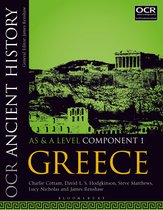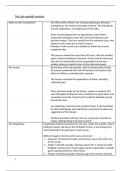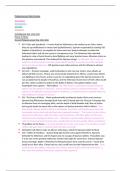OCR • Classics: Ancient History
Latest uploads for Classics: Ancient History at OCR. Looking for Classics: Ancient History notes at OCR? We have lots of notes, study guides and revision notes available for Classics: Ancient History at OCR.
-
31
- 0
-
9
Modules Classics: Ancient History at OCR
Notes available for the following courses of Classics: Ancient History at OCR
Popular books OCR • Classics: Ancient History
Latest content OCR • Classics: Ancient History

10/12 mark answer with feedback explaining how to make it 12. Sources include Tacitus and two physical sources. Past paper Roman Britain military question. From an A* student.
- Book & Paket-Deal
- Essay
- • 3 pages's •
10/12 mark answer with feedback explaining how to make it 12. Sources include Tacitus and two physical sources. Past paper Roman Britain military question. From an A* student.
9/10 answer to the 10-mark knowledge question with feedback explaining how to get 10. From an A* Ancient History student. Past paper Ancient Rome question about Augustus and his methods of securing a successor.
Ancient History A-Level OCR, answer to a 10-mark question. Gained 9/10 marks, feedback on how to make it 10 is also included. About the Persian Wars and the relations between Greek states in this period.
12-mark source question using a passage from Justin. From an A* student. Exemplar Ancient History essay answer to a past paper question. Module -the rise of Macedon.

Full marks model answer to a 36-mark question about Hadrian's Wall. Ancient History A2, Roman Britain topic.
- Book & Paket-Deal
- Essay
- • 2 pages's •
Full marks model answer to a 36-mark question about Hadrian's Wall. Ancient History A2, Roman Britain topic.
Ancient History A* A-level model answer for a 30-mark question about the ways Greek strategy developed during the start of the Peloponnesian War. Student went on to get full marks in the exam.
36-mark question which attained an A* grade. Student went on to achieve full UMS in the exam. Macedon and the Greek World comparison essay on Philip and Alexander's aims.
A/A* notes summarising the OCR specification, including coinage, direct quotes from the sources, and source references in 24 pages. I recommend these notes as they carried me through my Alevel revision for The Late Republic. Everything you need to know and understand to achieve top grades can be found in these notes! - Olivia Please check out my etsy shop for more revision notes and especially if these notes are slightly expensive a I've managed to offer more affordable options. :)
This is the hand written notes going through the timeline of Tacitus and Cassius Dio with analysis
Summative Notes of all the battles/ events in the Peloponnesian Wars between the years 425-404 B.C. (including Lysander, Arginusae etc.)These notes include source quotes, and are great for easily remembering every event on a basic level, and having quote association. Notes were created for Ancient History/Classics A-Level









